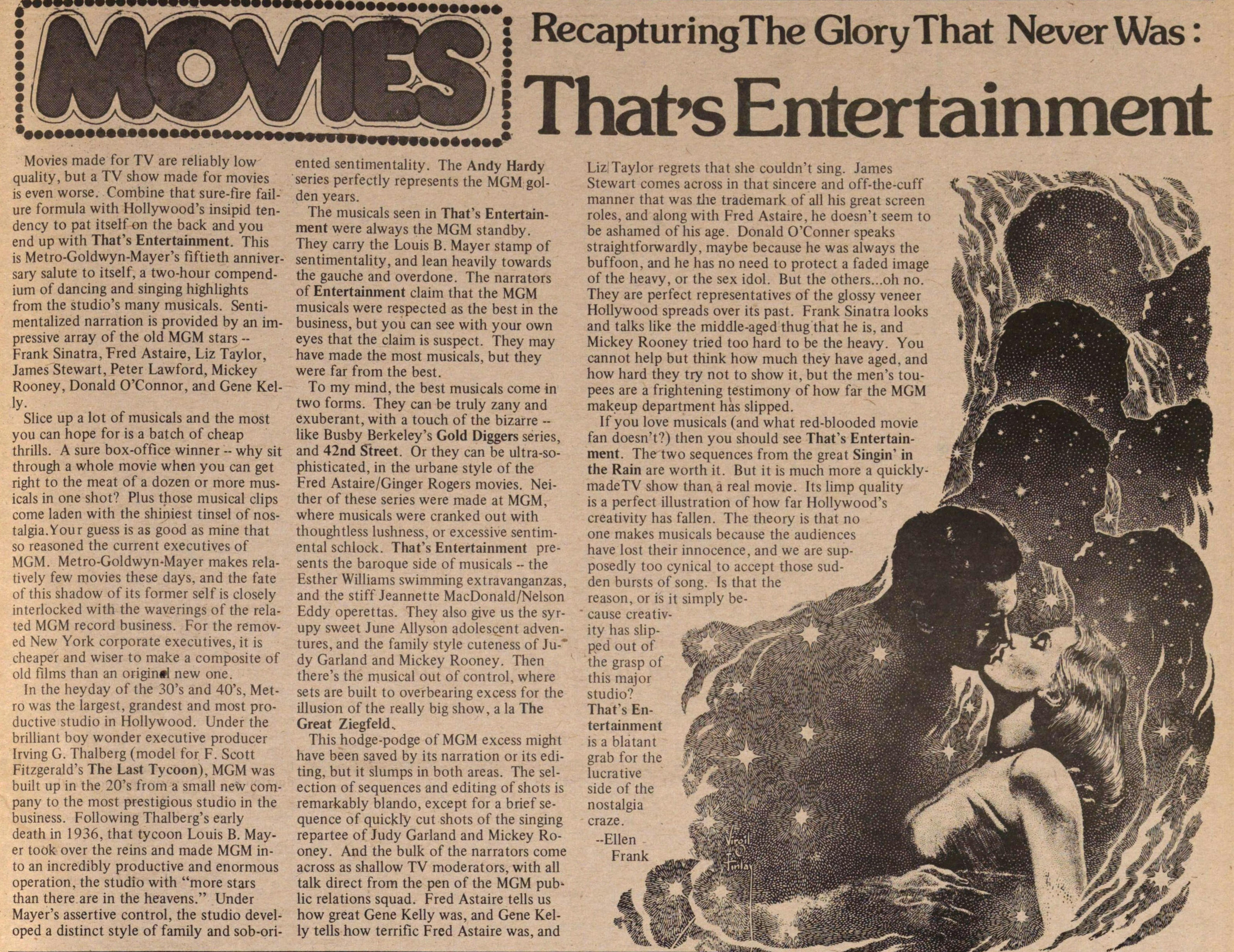Recapturing The Glory That Never Was: That's Entertainment

Recapturing The Glory That Never Was: That's Entertainment
Movies made for TV are reliably low quality, but a TV show made for movies is even worse. Combine that sure-fire failure formula with Hollywood's insipid tendency to pat itself on the back and you end up with That's Entertainment. This is Metro-Goldwyn-Mayer's fiftieth anniversary salute to itself, a two-hour compendium of dancing and singing highlights from the studio's many musicals. Sentimentalized narration is provided by an impressive array of the old MGM stars -- Frank Sinatra, Fred Astaire, Liz Taylor, James Stewart, Peter Lawford, Mickey Rooney, Donald O'Connor, and Gene Kelly.
Slice up a lot of musicals and the most you can hope for is a batch of cheap thrills. A sure box-office winner -- why sit through a whole movie when you can get right to the meat of a dozen or more musicals in one shot? Plus those musical clips come laden with the shiniest tinsel of nostalgia. Your guess is as good as mine that so reasoned the current executives of MGM. Metro-Goldwyn-Mayer makes relatively few movies these days, and the fate of this shadow of its former self is closely interlocked with the waverings of the related MGM record business. For the removed New York corporate executives, it is cheaper and wiser to make a composite of old films than an original new one.
In the heyday of the 30's and 40's, Metro was the largest, grandest and most productive studio in Hollywood. Under the brilliant boy wonder executive producer Irving G. Thalberg (model for F. Scott Fitzgerald's The Last Tycoon), MGM was built up in the 20's from a small new company to the most prestigious studio in the business. Following Thalberg's early death in 1936, that tycoon Louis B. Mayer took over the reins and made MGM into an incredibly productive and enormous operation, the studio with "more stars than there are in the heavens." Under Mayer's assertive control, the studio developed a distinct style of family and sob-oriented sentimentality. The Andy Hardy series perfectly represents the MGM golden years.
The musicals seen in That's Entertainment were always the MGM standby. They carry the Louis B. Mayer stamp of sentimentality, and lean heavily towards the gauche and overdone. The narrators of Entertainment claim that the MGM musicals were respected as the best in the business, but you can see with your own eyes that the claim is suspect. They may have made the most musicals, but they were far from the best.
To my mind, the best musicals come in two forms. They can be truly zany and exuberant, with a touch of the bizarre -- like Busby Berkeley's Gold Diggers series, and 42nd Street. Or they can be ultra-sophisticated, in the urbane style of the Fred Astaire/Ginger Rogers movies. Neither of these series were made at MGM, where musicals were cranked out with thoughtless lushness, or excessive sentimental schlock. That's Entertainment presents the baroque side of musicals -- the Esther Williams swimming extravanganzas, and the stiff Jeannette MacDonald/Nelson Eddy operettas. They also give us the syrupy sweet June Allyson adolescent adventures, and the family style cuteness of Judy Garland and Mickey Rooney. Then there's the musical out of control, where sets are built to overbearing excess for the illusion of the really big show, a la The Great Ziegfeld.
This hodge-podge of MGM excess might have been saved by its narration or its editing, but it slumps in both areas. The selection of sequences and editing of shots is remarkably blando, except for a brief sequence of quickly cut shots of the singing repartee of Judy Garland and Mickey Rooney. And the bulk of the narrators come across as shallow TV moderators, with all talk direct from the pen of the MGM public relations squad. Fred Astaire tells us how great Gene Kelly was, and Gene Kelly tells how terrific Fred Astaire was, and Liz Taylor regrets that she couldn't sing. James Stewart comes across in that sincere and off-the-cuff manner that was the trademark of all his great screen roles, and along with Fred Astaire, he doesn't seem to be ashamed of his age. Donald O'Conner speaks straightforwardly, maybe because he was always the buffoon, and he has no need to protect a faded image of the heavy, or the sex idol. But the others...oh no. They are perfect representatives of the glossy veneer Hollywood spreads over its past. Frank Sinatra looks and talks like the middle-aged thug that he is, and Mickey Rooney tried too hard to be the heavy. You cannot help but think how much they have aged, and how hard they try not to show it, but the men's toupees are a frightening testimony of how far the MGM makeup department has slipped.
If you love musicals (and what red-blooded movie fan doesn't?) then you should see That's Entertainment. The two sequences from the great Singin' in the Rain are worth it. But it is much more a quickly-made TV show than a real movie. Its limp quality is a perfect illustration of how far Hollywood's creativity has fallen. The theory is that no one makes musicals because the audiences have lost their innocence, and we are supposedly too cynical to accept those den bursts of song. Is that the reason, or is it simply because creativity has slipped out of the grasp of this major studio? That's Entertainment is a blatant grab for the lucrative side of the nostalgia craze.
--Ellen Frank
Article
Subjects
Freeing John Sinclair
Old News
Ann Arbor Sun